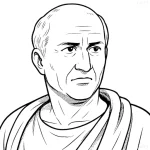“Empire and liberty.”

- January 3, 106 BC – December 7, 43 BC
- Roman
- Orator, Philosopher, Statesman, Lawyer, Author
table of contents
Quote
“Empire and liberty.”
Explanation
In these two words, Cicero evokes a profound and enduring tension between authority and freedom—between dominion over others and self-governance. “Empire” implies power, expansion, and control, often exercised through political or military force. “Liberty,” by contrast, suggests self-rule, civil rights, and the moral autonomy of individuals and communities. Cicero frequently explored how these two ideals conflict, coexist, or corrupt one another, especially in the waning days of the Roman Republic.
Cicero was a passionate defender of the Republican ideal, where liberty was preserved through balanced government, law, and civic virtue. Yet he lived in a time when Rome was rapidly transforming into an empire, concentrating power in the hands of a few. He feared that empire, while powerful, would eventually extinguish liberty, replacing shared governance with tyranny. For Cicero, the survival of liberty required legal restraint, moral leadership, and the rejection of autocratic ambition.
In modern times, the struggle between empire and liberty remains relevant—whether in geopolitical conflicts, debates over state power, or the balance between security and individual rights. Cicero’s enduring message is that true liberty cannot flourish under unchecked empire, and that the preservation of freedom demands constant vigilance, civic engagement, and a commitment to the rule of law.
Would you like to share your impressions or related stories about this quote in the comments section?

